一般疑问句和否定句的变法
否定句及一般疑问句
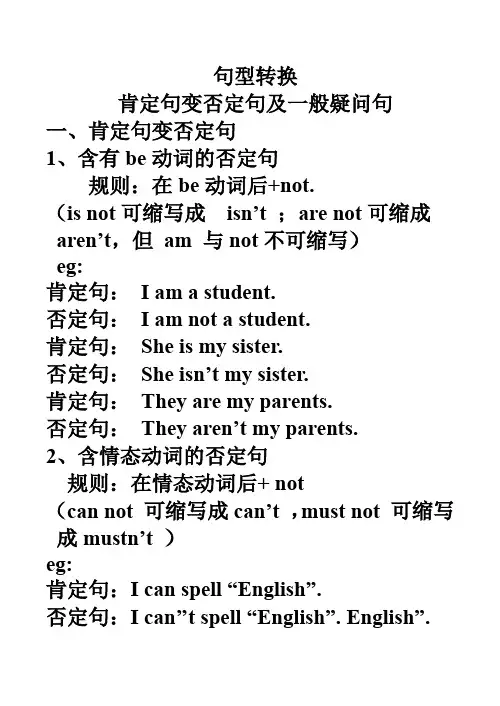
句型转换肯定句变否定句及一般疑问句一、肯定句变否定句1、含有be动词的否定句规则:在be动词后+not.(is not可缩写成isn’t ;are not可缩成aren’t,但am 与not不可缩写)eg:肯定句:I am a student.否定句:I am not a student.肯定句:She is my sister.否定句:She isn’t my sister.肯定句:They are my parents.否定句:They aren’t my parents.2、含情态动词的否定句规则:在情态动词后+ not(can not 可缩写成can’t ,must not 可缩写成mustn’t )eg:肯定句:I can spell “English”.否定句:I can’’t spell “English”.English”.肯定句:I must find it.否定句:I mustn’t find it.3、含有实义动词的句子的否定句构成(1)第三人称单数做主语。
(he、she、it或表示单个人或物的第三人称名词)规则:要在行为动词前加上助动词doesn’t,然后将动词恢复原形。
eg :肯定句:He has a soccer ball.否定句:He doesn’t have a soccer ball.(2)其它人称做主语规则:在行为动词前加don’t ,句子中的行为动词用原形。
eg:肯定句:They like bananas.否定句:They don’t like bananas.注:(1)在变否定句时,如遇some应变any Here are some books.Here aren’t any books.二、肯定句变一般疑问句1、含有be动词的句子变一般疑问句规则:把be动词提至句首,第一人称变第二人称,句末句号变问号。
(I/we变成youMy/our变成your)肯定句:I am a student.一般疑问句:Are you a student?肯定句:She is my sister.一般疑问句:Is she your sister?肯定句:They are my parents.一般疑问句:Are they your parents?2、含有情态动词的句子变一般疑问句规则:把情态动词提至句首,第一人称变第二人称,句末句号变问号。
七年级上册知识点总结一般现在时一般疑问句和否定句的变法.doc
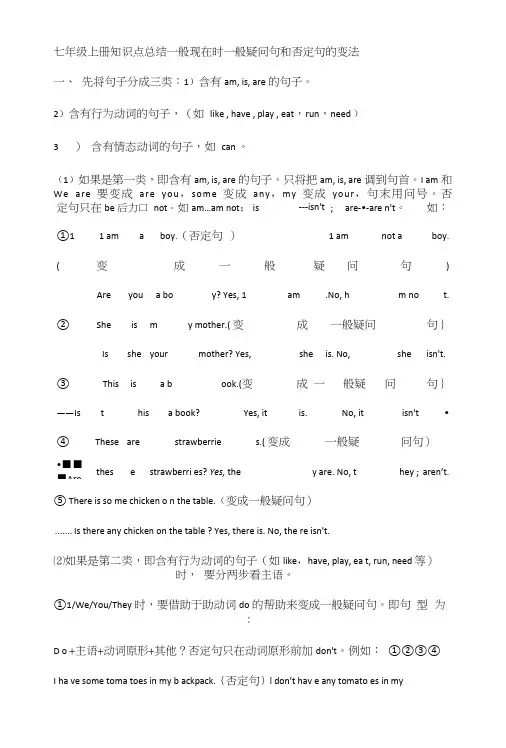
七年级上册知识点总结一般现在时一般疑问句和否定句的变法一、先将句子分成三类:1)含有am, is, are的句子。
2)含有行为动词的句子,(如like , have , play , eat,run,need )3 )含有情态动词的句子,如can 。
(1)如果是第一类,即含有am, is, are的句子。
只将把am, is, are调到句首。
I am和⑤ There is so me chicken o n the table.(变成一般疑问句)....... Is there any chicken on the table ? Yes, there is. No, the re isn't.⑵如果是第二类,即含有行为动词的句子(如like,have, play, ea t, run, need 等)时,要分两步看主语。
①1/We/You/They时,要借助于助动词do的帮助来变成一般疑问句。
即句型为:D o +主语+动词原形+其他?否定句只在动词原形前加don't。
例如:①②③④I ha ve some toma toes in my b ackpack.{否定句}l don't hav e any tomato es in mykpack.(变成一般疑问句}——Do you have any tomatoes in your backpa ck?Yes,Ido.No,Idon"t.We play sp orts every d ay.(否定句)一We don’t play sports ever y day. (变成一般疑问句卜-Do y ou play spor ts every day ? Yes, we do . No, we don’t.②He/She/It 时,要借助于助动词does 的帮助来变成一般疑问句。
即句型为: Does +主语+动词原形+其他?否定句只在动词前加does n't ,然后将单三还原 成原 形。
怎样变一般疑问句和否定句do或does
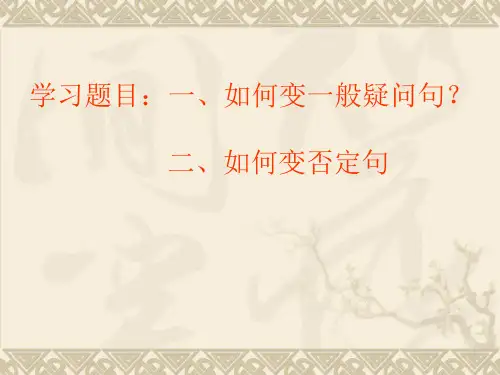
二.have/has的一般疑问句:
1.)have 的一般疑问句: a. I have a book .(变一般疑问句) Do you have a book ? b. They have many books . (变一般疑问句) Do they have many books ? c. We have many baseballs . (变一般疑问句) Do you have many baseballs ? 提示: have的一般疑问句是在句首加上助动词 ”Do” ,注意大小写的转 换,其他的不变.(句中的 “I”可以变为” you”) 注意: “Do” 是加上去的,不是原句里面的,当主语是复数时,也用do 来提问。
Eg.
怎样变一般疑问句
一.Be动词的一般疑问句:
Go on
句中有be(am is are)动词, 变一般疑问句时,需要 把(be )提前,我(I)变你(you),我的(my)变你的 (your),我们的(our)变你们的(your),千万别忘记。
Eg. This is a book.------It is an eraser.-------Is this a book? Is it an eraser? Is he a boy? Are they basketballs?
是的, 他是。 不,他不是。
We don’t have many baseballs .
小结: have的否定句是在主语和have之间加上助动词 ”don’t” , 注意: “don’t” 是加上去的,不是原句里面的。
2.)has 的否定句: a. He has a soccer ball .(变否定句)
He doesn’t have a soccer ball.
一般疑问句、否定句、特殊疑问句的改法
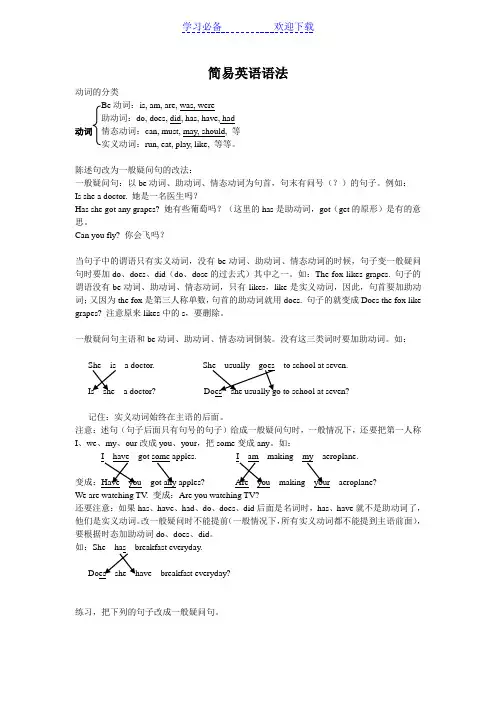
简易英语语法动词的分类Be动词:is, am, are, was, were助动词:do, does, did, has, have, had动词情态动词:can, must, may, should, 等实义动词:run, eat, play, like, 等等。
陈述句改为一般疑问句的改法:一般疑问句:以be动词、助动词、情态动词为句首,句末有问号(?)的句子。
例如:Is she a doctor. 她是一名医生吗?Has she got any grapes? 她有些葡萄吗?(这里的has是助动词,got(get的原形)是有的意思。
Can you fly? 你会飞吗?当句子中的谓语只有实义动词,没有be动词、助动词、情态动词的时候,句子变一般疑问句时要加do、does、did(do、dose的过去式)其中之一。
如:The fox likes grapes. 句子的谓语没有be动词、助动词、情态动词,只有likes,like是实义动词,因此,句首要加助动词;又因为the fox是第三人称单数,句首的助动词就用does. 句子的就变成Does the fox like grapes? 注意原来likes中的s,要删除。
一般疑问句主语和be动词、助动词、情态动词倒装。
没有这三类词时要加助动词。
如:She is a doctor. to school at seven.Is she a doctor? Does记住:实义动词始终在主语的后面。
注意:述句(句子后面只有句号的句子)给成一般疑问句时,一般情况下,还要把第一人称I、we、my、our改成you、your,把some变成any。
如:making变成:Have you got any apples? Are you your aeroplane?We are watching TV. 变成:Are you watching TV?还要注意:如果has、have、had、do、does、did后面是名词时,has、have就不是助动词了,他们是实义动词。
七年级上册知识点总结一般现在时一般疑问句和否定句的变法
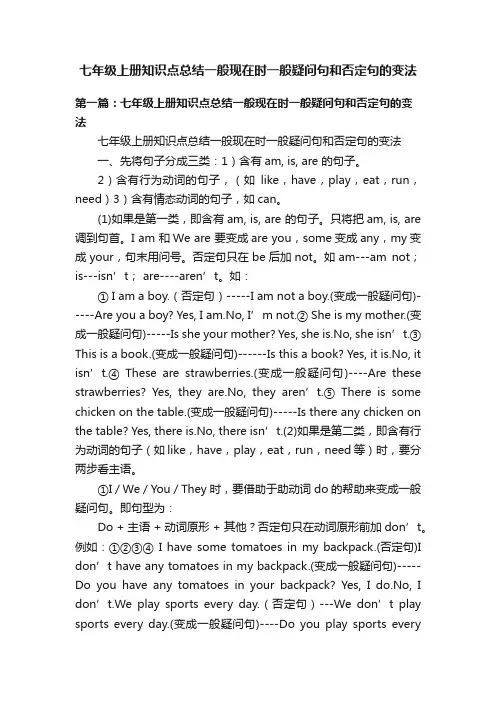
七年级上册知识点总结一般现在时一般疑问句和否定句的变法第一篇:七年级上册知识点总结一般现在时一般疑问句和否定句的变法七年级上册知识点总结一般现在时一般疑问句和否定句的变法一、先将句子分成三类:1)含有am, is, are 的句子。
2)含有行为动词的句子,(如like,have,play,eat,run,need)3)含有情态动词的句子,如can。
(1)如果是第一类,即含有am, is, are 的句子。
只将把am, is, are 调到句首。
I am 和We are 要变成are you,some变成any,my变成your,句末用问号。
否定句只在be后加not。
如am---am not;is---isn’t; are----aren’t。
如:① I am a boy.(否定句)-----I am not a boy.(变成一般疑问句)-----Are you a boy? Yes, I am.No, I’m not.② She is my moth er.(变成一般疑问句)-----Is she your mother? Yes, she is.No, she isn’t.③ This is a book.(变成一般疑问句)------Is this a book? Yes, it is.No, it isn’t.④ These are strawberries.(变成一般疑问句)----Are these strawberries? Yes, they are.No, they aren’t.⑤ There is some chicken on the table.(变成一般疑问句)-----Is there any chicken on the table? Yes, there is.No, there isn’t.(2)如果是第二类,即含有行为动词的句子(如like,have,play,eat,run,need等)时,要分两步看主语。
改为一般疑问句的公式
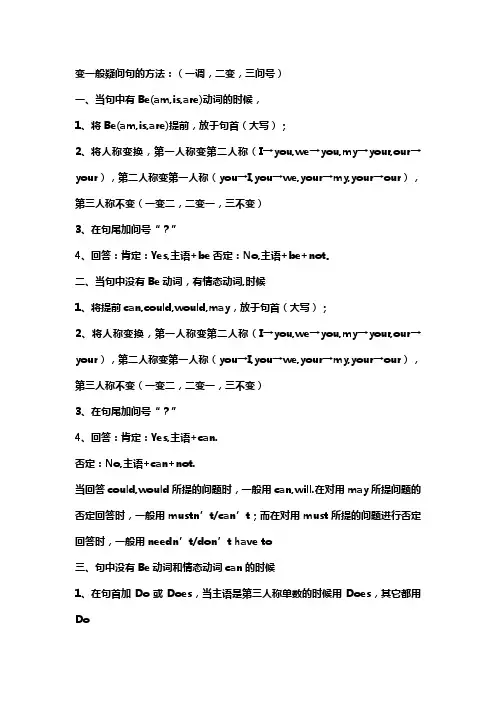
变一般疑问句的方法:(一调,二变,三问号)一、当句中有Be(am,is,are)动词的时候,1、将Be(am,is,are)提前,放于句首(大写);2、将人称变换,第一人称变第二人称(I→you,we→you,my→your,our→your),第二人称变第一人称(you→I,you→we,your→my,your→our),第三人称不变(一变二,二变一,三不变)3、在句尾加问号“?”4、回答:肯定:Yes,主语+be否定:No,主语+be+not。
二、当句中没有Be动词,有情态动词,时候1、将提前can,could,would,may,放于句首(大写);2、将人称变换,第一人称变第二人称(I→you,we→you,my→your,our→your),第二人称变第一人称(you→I,you→we,your→my,your→our),第三人称不变(一变二,二变一,三不变)3、在句尾加问号“?”4、回答:肯定:Yes,主语+can.否定:No,主语+can+not.当回答could,would所提的问题时,一般用can,will.在对用may所提问题的否定回答时,一般用mustn’t/can’t;而在对用must所提的问题进行否定回答时,一般用needn’t/don’t have to三、句中没有Be动词和情态动词can的时候1、在句首加Do或Does,当主语是第三人称单数的时候用Does,其它都用Do2、将人称变换,第一人称变第二人称(I→you,we→you,my→your,our→your),第二人称变第一人称(you→I,you→we,your→my,your→our),第三人称不变(一变二,二变一,三不变)3、在句尾加问号“?”4、回答:肯定:Yes,主语+do/does否定:No,主语+do/does+not.其它在句中要变换的词有some→any,am→are英语里只有三种人称:第一人称:我,我们,(I),we【me,us】(我),我们第二人称:你,你们,(you),you【you,you】(你),你们第三人称:他,她,它(he,she,it,)【him,her,it】他们they【them】还有一些人名也算第三人称,比如Kangkang,Jane.像your father(你的爸爸)这也算第三人称.第三人称单数指他(he)她(she)它(it)或者单个人名,第三人称复数是都用they他们/她们/它们此外,不可数名词在用法上也同于第三人称单数。
一般疑问句和否定句的变法
〔二〕否认句 一、在be动词〔am is are〕和情态动词 (can, may, must...)后面加not,其它照写。 some变成any. 例如:陈述句: They are in the park.
He can play the guitar.. 否认句: They are not in the park.
二、借助动词don’t/doesn’t,第三人称单数用 doesn’t,其余人称用don’t,放到人称后面 动词前面其他照写。
特别记住:前面用doesn’t,后面的动词一定 复原成原形。Some变成any.
例如:陈述句: I like the ducks.
He likes the dogs. 否认句: I don’t like the ducks.
He can not play the guitar. 或: They aren’t in the park.
He can’t play the guitar. am not 不能缩写 is not=isn’t
把以下句子变成否认句 1. I am listening to music. 2. Mike is a student. 3. Sarah can clean the classroom. 4. They are in the zoo. 5. There are some flowers in the park. 6.This is my sister.
二、借助助动词do/does,第三人称单数用 does,其余人称用do,放到句首,其他照写 特别记住:前面用does,后面的动词一定还 原成原形。遇/we—you, my—your, some—any. 句号变成问号〔?〕 例如:陈述句: I like the ducks.
怎样变一般疑问句和否定句
4. I have a bag . _D_o__y_o_u__h_a_v_e__a_b_a_g_?__________________________
2.)has 旳一般疑问句: a. He has a soccer ball .(变一般疑问句)
Does he have a soccer ball ? b. She has a ping-pang bat . (变一般疑问句)
Does she a have ping-pang bat ?
c. Jane has a tennis racket . (变一般疑问句)
I am a boy.----------- Are you a boy?
二.have/has旳一般疑问句:
1.)have 旳一般疑问句: a. I have a book .(变一般疑问句)
Do you have a book ? b. They have many books . (变一般疑问句)
b. They have many books . (变一般否定句)
They don’t have many books .
c. We have mve many baseballs .
小结: have旳否定句是在主语和have之间加上助动词 ”don’t” , 注 意: “don’t” 是加上去旳,不是原句里面旳。
2. Li Lei has a volleyball . _L_i L_e_i__d_o_e_sn_’__t_h_a_v_e_a__vo_l_le_y_b_a_ll_._______________
七年级英语上否定句及一般疑问句的知识点
句型转换肯定句变否定句及一般疑问句一、肯定句变否定句1、含有be动词的否定句规则:在be动词后+not. (is not可缩写成isn’t ;are not可缩写成aren’t但am 与not不可缩写)eg: (1)肯定句:I am a student. 我是一名学生否定句:I am not a student. 我不是一名学生(2)肯定句:She is my sister. 她是我的妹妹。
否定句:She isn’t my sister. 她不是我的妹妹。
(3)肯定句:They are my parents. 他们是我的父母否定句:They aren’t my parents. 他们不是我的父母活学活用将下列句子变为否定句1.The keys are on the table.______________________________________2.This is my sister.____________________________________________3. A computer game is in the school library.___________________________________4.I am in China now.________________________________________2、含情态动词的否定句规则:在情态动词后+ not,必要时可缩写。
(比如:can not 可缩写成can’tmust not 可缩写成mustn’t )eg: (1)肯定句:I can spell “English”. 我能拼写English”。
否定句:I can’’t spell “English”.我不能拼写English”.(2)肯定句:I must find it. 我必须找到它否定句:I mustn’t find it.我禁止找到它。
活学活用将下列句子变为否定句1.You can eat well for breakfast.________________________________2.I can go to school on Monday.__________________________________3.She can watch TV on Saturday.__________________________________3、含有实义动词的句子的否定句构成(1)第三人称单数做主语。
一般疑问句、否定句、特殊疑问句的改法
简易英语语法动词的分类Be动词:is, am, are, was, were助动词:do, does, did, has, have, had动词情态动词:can, must, may, should, 等实义动词:run, eat, play, like, 等等。
陈述句改为一般疑问句的改法:一般疑问句:以be动词、助动词、情态动词为句首,句末有问号(?)的句子。
例如:Is she a doctor. 她是一名医生吗?Has she got any grapes? 她有些葡萄吗?(这里的has是助动词,got(get的原形)是有的意思。
Can you fly? 你会飞吗?当句子中的谓语只有实义动词,没有be动词、助动词、情态动词的时候,句子变一般疑问句时要加do、does、did(do、dose的过去式)其中之一。
如:The fox likes grapes. 句子的谓语没有be动词、助动词、情态动词,只有likes,like是实义动词,因此,句首要加助动词;又因为the fox是第三人称单数,句首的助动词就用does. 句子的就变成Does the fox like grapes? 注意原来likes中的s,要删除。
一般疑问句主语和be动词、助动词、情态动词倒装。
没有这三类词时要加助动词。
如:She is a doctor. to school at seven.Is she a doctor? Does记住:实义动词始终在主语的后面。
注意:述句(句子后面只有句号的句子)给成一般疑问句时,一般情况下,还要把第一人称I、we、my、our改成you、your,把some变成any。
如:making变成:Have you got any apples? Are you your aeroplane?We are watching TV. 变成:Are you watching TV?还要注意:如果has、have、had、do、does、did后面是名词时,has、have就不是助动词了,他们是实义动词。
- 1、下载文档前请自行甄别文档内容的完整性,平台不提供额外的编辑、内容补充、找答案等附加服务。
- 2、"仅部分预览"的文档,不可在线预览部分如存在完整性等问题,可反馈申请退款(可完整预览的文档不适用该条件!)。
- 3、如文档侵犯您的权益,请联系客服反馈,我们会尽快为您处理(人工客服工作时间:9:00-18:30)。
把下列句子变成一般疑问句 2. Mike is a student. 3.Sarah can clean the classroom. 4.I am in the zoo. 5.There are some flowers in the vase.
6.This is my sister.
7.We are sweeping the floor.
(二)否定句
一、在be动词(am is are)和情态动词 (can, may, must...)后面加not,其它照写。 some变成any. 例如:陈述句: They are in the park. He can play the guitar.. 否定句: They are not in the park. He can not play the guitar. 或: They aren’t in the park. He can’t play the guitar. am not 不能缩写 is not=isn’t are not=aren’t can not=can’t
二、借助动词don’t/doesn’t,第三人称单数用 doesn’t,其余人称用don’t,放到人称后面, 动词前面其他照写。 特别记住:前面用doesn’t,后面的动词一定 还原成原形。Some变成any. 例如:陈述句: I like the ducks. He likes the dogs. 否定句: I don’t like the ducks. He doesn’t like the dogs?
把下列句子改为一般疑问句。
We need some masks. They like making the puppet.
Su Hai and Su Yang live in a new house. 4.I put a book on my head. 6.We play basketball on Sundays. 7. Tom likes listening to music
把下列句子变成否定句 1. I am listening to music.
2. Mike is a student.
3. Sarah can clean the classroom. 4. They are in the zoo. 5. There are some flowers in the park. 6.This is my sister.
把下列句子改为否定句。 We need some masks.
They like making the puppet.
Su Hai and Su Yang live in a new house. 4.I put a book on my head. 5.We play basketball on Sundays. 6. Tom likes listening to music
一般疑问句和否定句的变法
--------闫彩虹
教学目标:1.学习一般疑问句和否定句的 变化规则。 重 难 点:1.在一般疑问句中人称的变化。 2.some在一般疑问句和否定句的 变化。
(一)一般疑问句
一、把be动词(am is are)和情态动词 (can, may, must...)放到句首, 其它照写。遇I/we—you, my—your. some—any. 句号变成问号(?) 例如:陈述句: They are in the park. He can play the guitar. 一般疑问句: Are they in the park? Can he play the guitar?
二、借助助动词do/does,第三人称单数用 does,其余人称用do,放到句首,其他照写 特别记住:前面用does,后面的动词一定还 原成原形。遇I/we—you, my—your, some—any. 句号变成问号(?) 例如:陈述句: I like the ducks. He likes the dogs. 一般疑问句:Do you like the ducks? Does he like the dogs?
